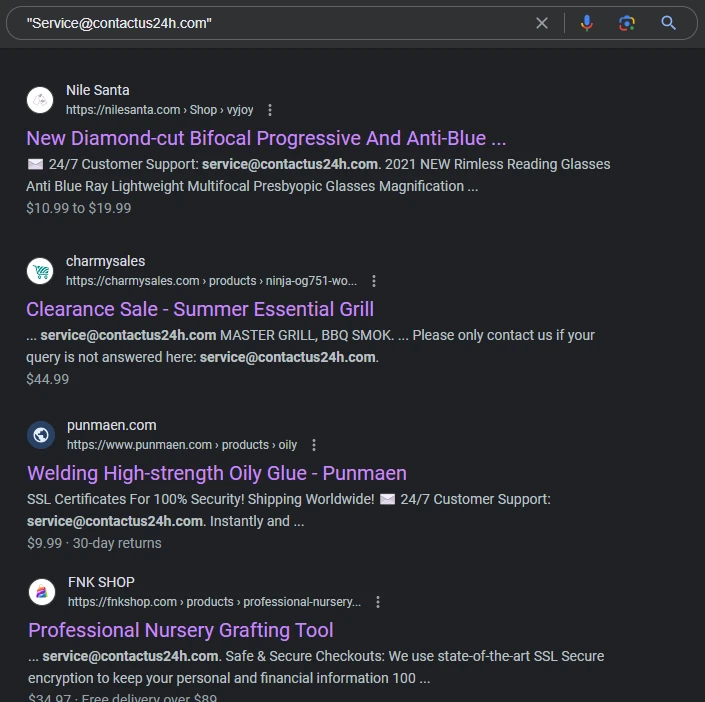Quickprix.Shop is a scam website that offers to buy flowers at exceptionally cheap prices. It may appear as a discounter, or as a marketplace for warehouse liquidation items, but it is actually just a ploy to make you think about this site as a legitimate one. After placing an order on this site, you will most likely get nothing at all, or, at best, poor-quality or counterfeit items.
In this article, I will highlight the concerning indicators regarding the Quickprix.Shop shop, the way this scam operates, and teach how to detect similar scams. This will help you to avoid similar shopping deceptions in upcoming times.
Quickprix.Shop Site – Scam Overview
As I said, Quickprix.Shop may initially appear like a genuine discounter or the seller of stock liquidation items. But a quick analysis shows a disturbing amount of red flags that say clearly about this site’s deception. Questionable advertising methods, excessively low prices, lack of customer support and user feedback – this site accomplishes the fraud bingo right away.
| Website | Quickprix.Shop |
| Hosting | AS13335 Cloudflare, Inc. United States, San Francisco |
| IP Address | 104.18.26.44 |
| Threat Type | Scam/Fraud |
| Scam Type | Fraudulent/Scam online shop |
By purchasing items on websites like Quickprix.Shop, it is doubtful that you will get the goods you’ve ordered. More typically, it results in one of 3 scenarios common for scam sites.
Counterfeit goods. Not the worst option, as you get at least something. But as it usually happens to imitation items of popular brands, the quality will be inferior, to say the least. Eventually, the site may notify about that somewhere deep in the item description or “about us” page, but users rarely check them thoroughly. This is a specifically common case when ordering from pages that offer baubles, small electronics and stuff the like.
Wrong item. To make the purchase look real, but spend even less money on the delivered item, rascals may ship a incidental item they have on hand instead of what you’ve ordered. An old t-shirt instead of a brand new one, a dirty aluminum plate instead of a set of dishes – frauds may turn really inventive in that case.
Absolutely nothing. This is the most common case when ordering goods from websites like Quickprix.Shop. Scams take your money, promise the delivery, and then simply disappear. As scam sites do not aim to exist for a long time, rascals do not bother themselves with creating even a faint semblance of legitimacy.
Quickprix.Shop scam – How does it work?
As any fraud, Quickprix.Shop runs a simple and well-proven scheme of operations. It usually consists of 3 stages, with certain deviations from time to time.
Step 1 – Attract the Masses. Scammers post massive amounts of advertisements on social media, particularly preferring Facebook, YouTube, Instagram and TikTok. Paid ads say the same things as their sites do: 90% discounts, free delivery around the world, hurry up to get the deal.
As users regard ads on the mentioned platforms legitimate, they do not suspect anything at this point. Ads become especially persuasive during major events that boost people’s interest in shopping, like Halloween, Black Friday, Christmas, etc. Sometimes, they disguise themselves as resellers of the liquidated stock of bankrupt retail companies.
Step 2 – Take the Money. Once customers are on the site, scammers do their best to make the customers buy something. Impossibly good deals, additional discounts, free delivery, bright and blinking “Order Now” buttons that are just everywhere – they use every single method possible. And this works out – uninformed customers stick to the offers and proceed to paying for the order.
Payments are done in a strange manner. Instead of more classic options for online shopping, like Visa/MasterCard payments or PayPal, scammers offer using direct bank transfers, Venmo or CashApp. Thing is, the latter do not provide any refunds, regardless of the circumstances. Even when you can prove that the transaction went to scammers, “no refunds” is a part of their policy which you agree on upon registration.
Step 3 – Vanish. Once scoundrels get enough money, or – what is more likely – there are enough complaints and user feedback regarding the site being fraudulent, they simply vanish. Usually, this happens at around the 2nd or 3rd week of the site activity. Once enough people know about the deceptive activity, the profits will dry up, leaving crooks with no motivation to move on. Reporting the scam to the domain hosting helps take the domain down pretty quickly.
Why is Quickprix.Shop a Scam?
Well, we just talked about the way the hoax site operates. Now, let’s see how to understand whether the site is deceptive without risking your money. Fortunately, scammers do not bother themselves with creating well-rounded disguises, so the same red flags repeat from one site to another.
1. Fake or absent reviews
Fraud websites aim to exist for 1-2 weeks, so there’s no purpose (and way) to make any online reputation with feedback. Obviously, even benign online shopping sites will lack customer reviews when they have just started, as there were just a few buyers yet. For that reason, this sign is not stand-alone and must be confirmed with other signs or indicators.
However, when you face phishy-looking reviews that have nothing to do with what the site offers for sale, that’s definitely not a good sign. Any vague or gibberish reviews that may describe any item sold on the website should be taken with a grain of salt. And well, on scam websites you will get an entire saltcellar. Do not hesitate searching for reviews on Google – this may save your money.
2. Unbelievably high discounts/low prices
No merchants will sell goods at loss for themselves. 70%, 80%, 90% markdowns are not feasible even during sales events such as the aforementioned Black Friday. In some cases, deceptive sites set the prices low without saying anything about discounts, but they will most likely be ludicrous, like $30 for a bed or $10 for a branded leather bag. Goods may be sold at a low price, but every sell-off has its sensible limits.
3. No customer support.
That factor distinguishes dishonest websites from the legit ones, even newly established. When a site is about to rip off the customers, there’s no need to waste time on answering their questions. Check out the “About us” or “Info” page (if it is present at all) – the site will most likely have no contact info whatsoever.
When they offer an email, or even a phone number to contact them, there is a huge chance that these numbers and emails will be dead silent to your request. This, or they will answer you with generic text regardless of your question.
As frauds tend to reuse numbers and emails for specifying them as “support”, you can search them on Google. When they are mentioned on a different site, be sure you’re facing a blatant scam.
4. Payments via payment systems that does not support refunds
This scam indicator is complementary, as there are a whole lot of benign shops and services using direct bank transfers, CashApp, Venmo or payment systems like them. Each of the latter has the same feature I’ve already mentioned above: they do not suppose any refunds. And this is what attracts scammers – once you paid for the order, there’s no way to get the money back.
Some websites may also ask for payments in cryptocurrency, which is even less controllable than aforementioned payment methods. While crypto payments expand their presence slowly, they still remain a beloved bay for different frauds.
5. Items’ images are sourced from another page
As scammers most likely don’t have any real items on hand, they are not able to make unique pictures. Thus their option is simply to steal these images elsewhere. When crooks offer identical goods on different websites, you can find such pics on similarly-looking fraudulent sites. By reverse image searching on Google, you can prove whether the image is unique or not.
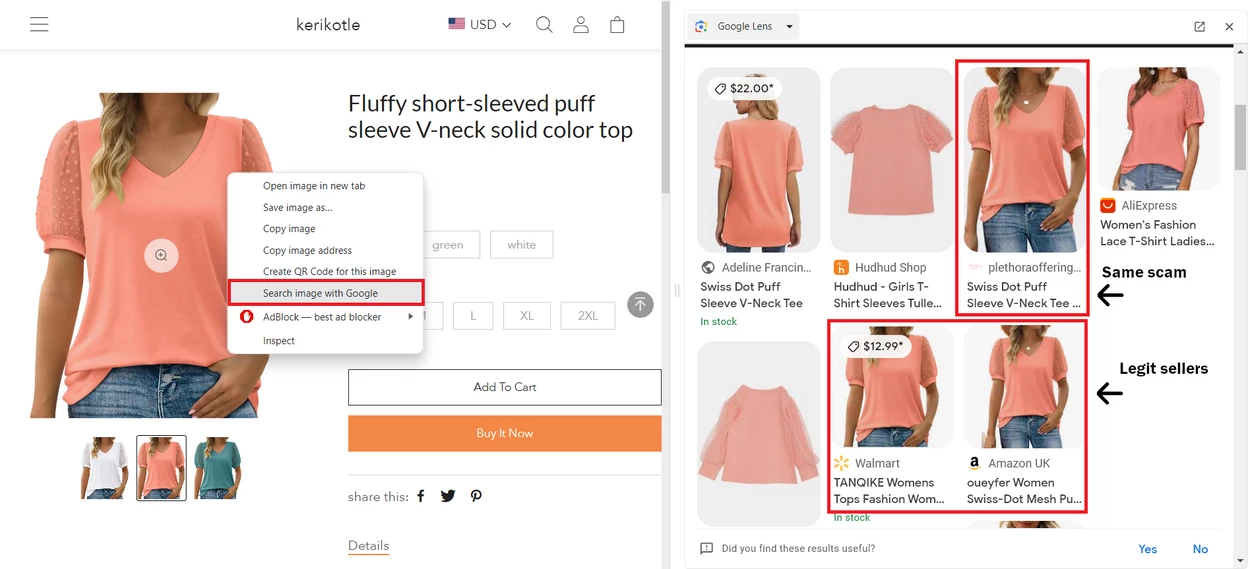
Image duplicates on another scam site, as well as on Amazon and Walmart sites
6. Design repeats the one of a different page
Scammers do not steal only photos. As rascals may use the same topic repeatedly, they use the same site design under the new URL, and voila – a new scam is ready to rock-n-roll! In some cases, image search advice I’ve mentioned above may lead you to the identical copy of the page you’ve started on. It allows you to uncover such frauds particularly easy, but criminals who stand behind them never aim at cautious users.

Example of scam sites that duplicate each others’ design
Is your PC infected?
There are situations when Quickprix.Shop site, along with similar scam sites, are promoted by malware. Adware and browser hijackers are two particular malware types known for such behavior. If you notice excessive amounts of ads appearing in your browser, have your search inquiries going into a different search engine and some random pages open time to time, scan your device with GridinSoft Anti-Malware. This will help you to get rid of annoying promotions and scam sites.
Remove malware with Gridinsoft Anti-Malware
We have also been using this software on our systems ever since, and it has always been successful in detecting viruses. It has blocked the most common adware as shown from our tests with the software, and we assure you that it can remove malware as well as other malware hiding on your computer.
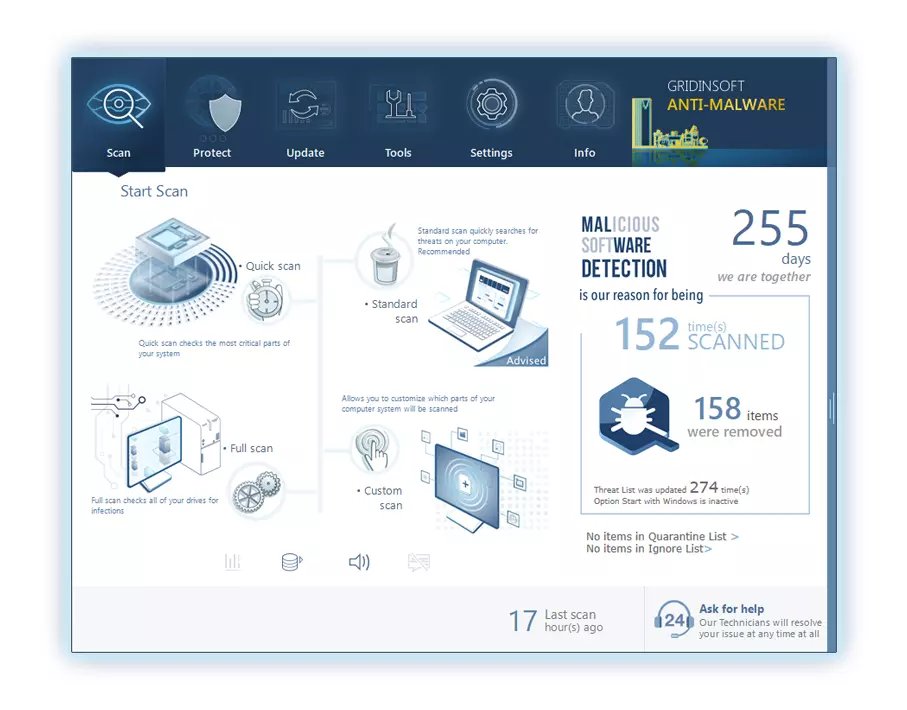
To use Gridinsoft for remove malicious threats, follow the steps below:
1. Begin by downloading Gridinsoft Anti-Malware, accessible via the blue button below or directly from the official website gridinsoft.com.
2.Once the Gridinsoft setup file (setup-gridinsoft-fix.exe) is downloaded, execute it by clicking on the file.
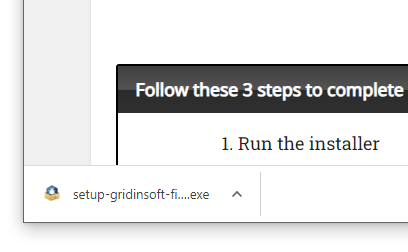
3.Follow the installation setup wizard's instructions diligently.
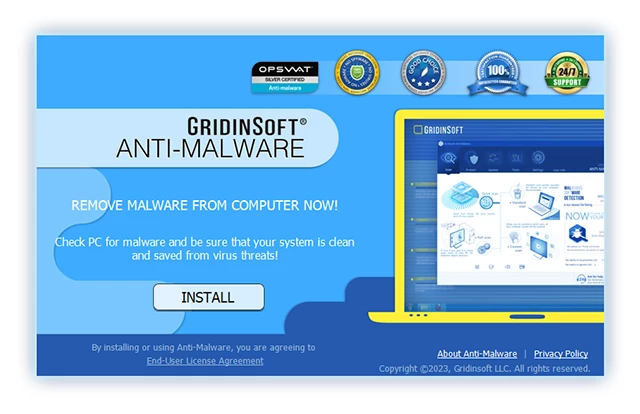
4. Access the "Scan Tab" on the application's start screen and launch a comprehensive "Full Scan" to examine your entire computer. This inclusive scan encompasses the memory, startup items, the registry, services, drivers, and all files, ensuring that it detects malware hidden in all possible locations.
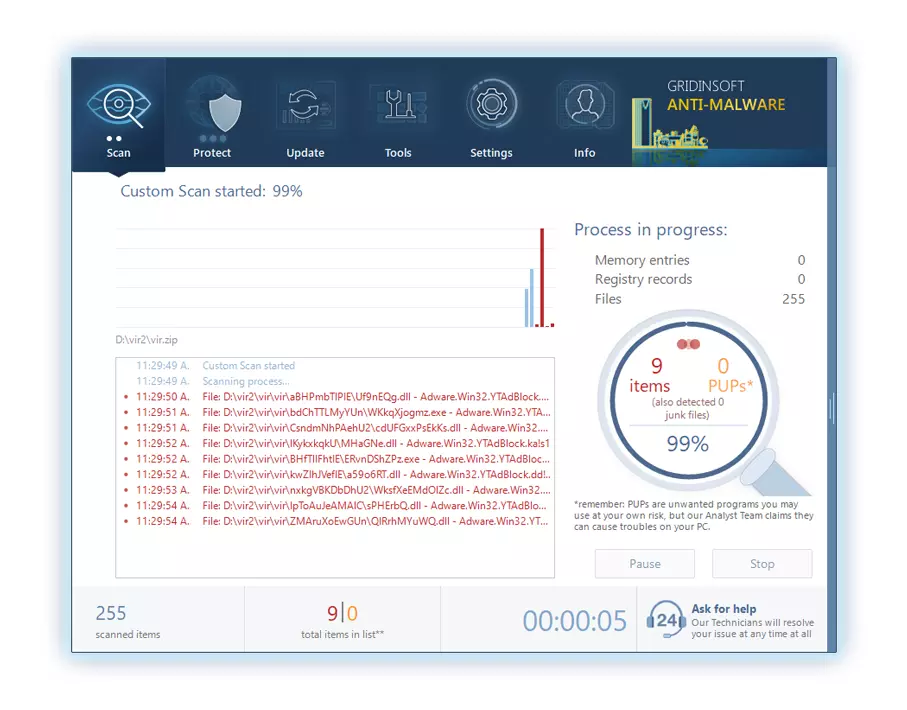
Be patient, as the scan duration depends on the number of files and your computer's hardware capabilities. Use this time to relax or attend to other tasks.
5. Upon completion, Anti-Malware will present a detailed report containing all the detected malicious items and threats on your PC.
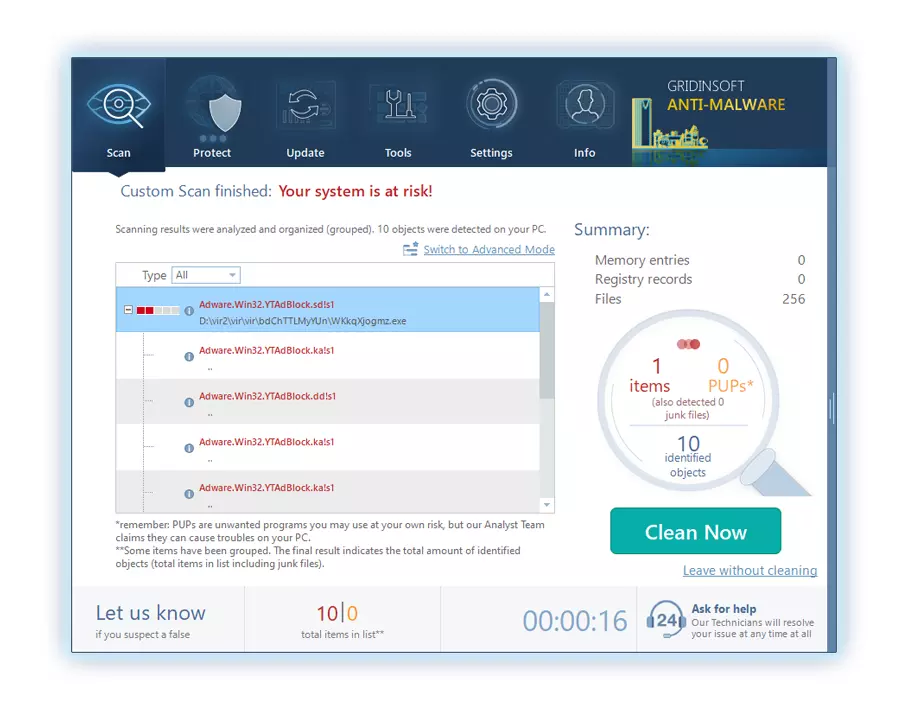
6. Select all the identified items from the report and confidently click the "Clean Now" button. This action will safely remove the malicious files from your computer, transferring them to the secure quarantine zone of the anti-malware program to prevent any further harmful actions.
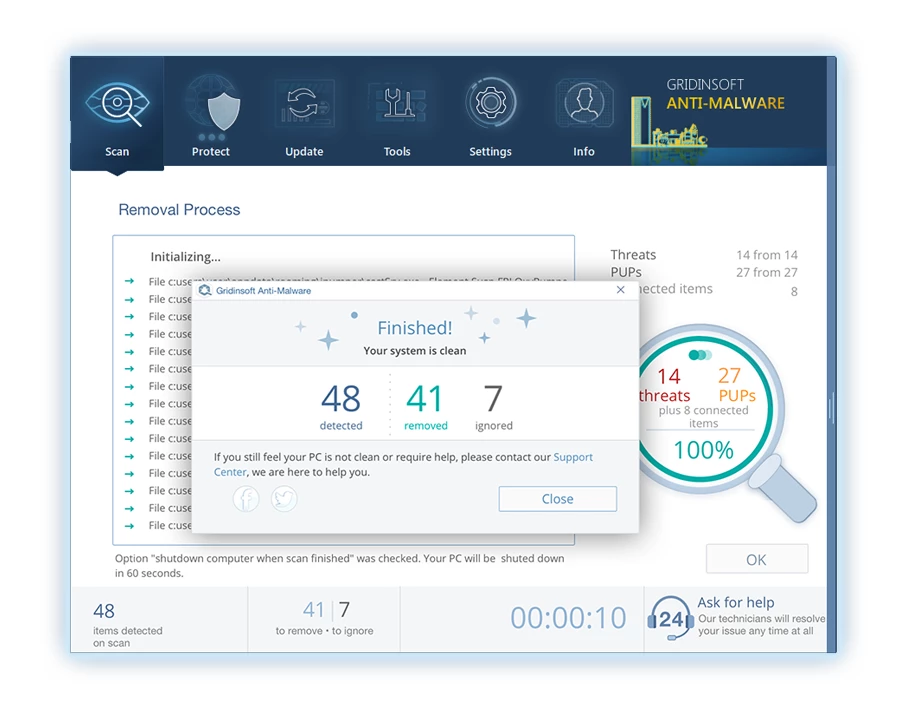
8. If prompted, restart your computer to finalize the full system scan procedure. This step is crucial to ensure thorough removal of any remaining threats. After the restart, Gridinsoft Anti-Malware will open and display a message confirming the completion of the scan.
Remember Gridinsoft offers a 6-day free trial. This means you can take advantage of the trial period at no cost to experience the full benefits of the software and prevent any future malware infections on your system. Embrace this opportunity to fortify your computer's security without any financial commitment.
Frequently Asked Questions about the Quickprix.Shop Scam
Quickprix.Shop operates as a scam website that pretends to be an online store selling various items at low prices. However, it is involved in fraudulent activities and aims to deceive customers by sending counterfeit or inferior products or not delivering anything at all.
There are several indicators that point at fraudulent nature of Quickprix.Shop shop. Firstly, Quickprix.Shop shop recently established its online platform, which is a typical characteristic of short-lived scam sites that rapidly disappear. Second, the website lacks contact details such as a phone number, physical address, or live chat alternative, making it difficult to resolve issues or inquiries. Thirdly, it provides fake business information, presenting no genuine data about the company behind the webpage. Additionally, this fraudulent scheme entices customers with impractical discounts and sales offers, cutting prices by over 70% or even 90%. Moreover, Quickprix.Shop reproduces content and product images from genuine web shops like Alibaba, Amazon, and Aliexpress, showing a lack of unique ideas and trustworthiness. Furthermore, despite claiming to provide trendy and stylish products, the site lacks any social media presence or links to online networking platforms. Lastly, genuine customer feedback is completely absent, with reports of delayed or missing deliveries, poor customer service, flawed or wrong products, refund difficulties, and unauthorized billing on credit cards.
No, it is not a legitimate or reliable website. The aforementioned red flags indicate that it lacks credibility and has been reported as a scam site. Customers have experienced receiving counterfeit products or facing difficulties in obtaining refunds or contacting the company.
Take the following steps if you have made a purchase on Quickprix.Shop:
- Firstly, immediately contact your bank or financial institution if you paid with a credit card or debit card. Request them to cancel the transaction and initiate a refund. Additionally, report Quickprix.Shop as a fraudulent site and urge them to block future charges from it.
- Promptly change your passwords if you have a Quickprix.Shop account or use the same password for other online accounts. Consider enabling two-factor authentication to enhance security against hackers attempting to access your accounts and steal personal information.
- Beware of phishing emails related to your Quickprix.Shop order. Treat any emails offering discounts or refunds as phishing attempts. Avoid clicking on suspicious links or downloading attachments that may contain malware. Delete such emails immediately.
- To prevent malicious ads, Trojans, phishing attempts, and other undesirable content, use a browser-based content blocker like AdGuard. This will complement your antivirus software and provide enhanced protection.
- If you suspect your device is infected with malware, scan it using Gridinsoft Anti-Malware to ensure your security.
No, Quickprix.Shop does not have genuine customer feedback or testimonials. The absence of legitimate customer reviews further indicates its untrustworthiness and potentially fraudulent nature.






